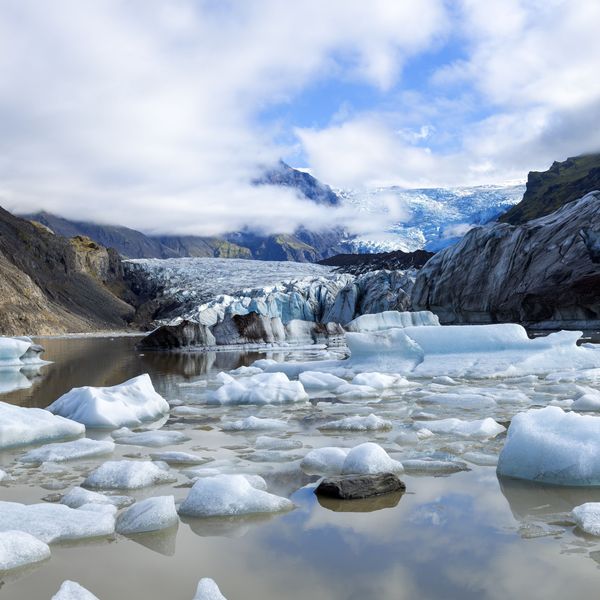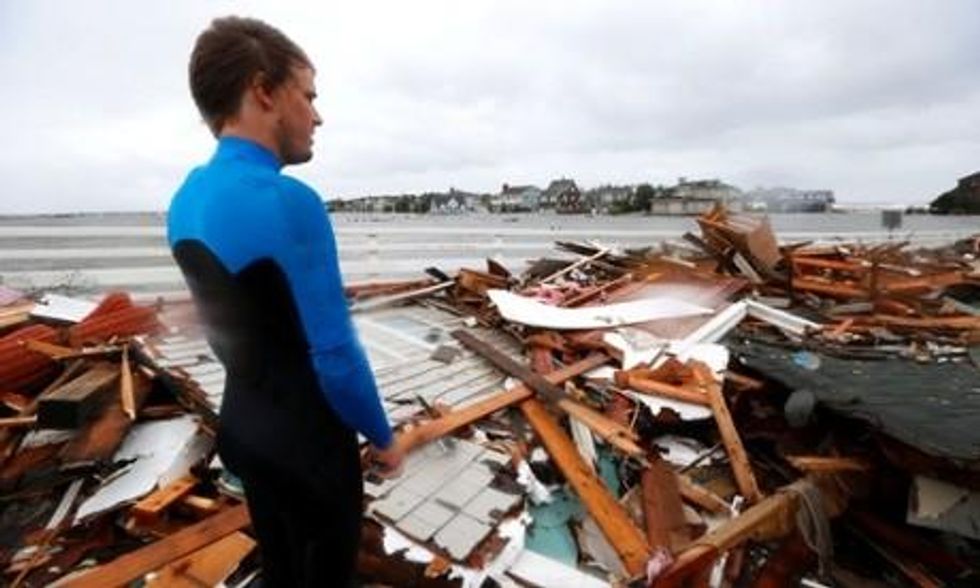Here's a sentence I wish I hadn't written - it rolled out of my Macbook in May, part of an article for Rolling Stone that quickly went viral:
"Say something so big finally happens (a giant hurricane swamps Manhattan, a megadrought wipes out Midwest agriculture) that even the political power of the industry is inadequate to restrain legislators, who manage to regulate carbon."
I wish I hadn't written it because the first half gives me entirely undeserved credit for prescience: I had no idea both would, in fact, happen in the next six months. And I wish I hadn't written it because now that my bluff's been called, I'm doubting that even Sandy, the largest storm ever, will be enough to make our political class serious about climate change.
Maybe I'm wrong, though. Maybe - just maybe - the arrival of a giant wall of water in the exact middle of the financial and media capital of our home planet will be enough to get this conversation unstuck. Maybe that obscene slick of ocean spreading unnaturally into the tubes and tunnels of the greatest city on earth will shock enough people to change the debate. New York Governor Andrew Cuomo, at a press conference Tuesday afternoon, allowed as how:
"There has been a series of extreme weather incidents. That is not a political statement, that is a factual statement ... Anyone who says there's not a dramatic change in weather patterns, I think, is denying reality."
New York Mayor Michael Bloomberg added:
"What is clear is that the storms we've experienced in the last year or so around this country and around the world are much more severe than before."
Truthfully, I think I'd just as soon see statements like that as carefully thought-out endorsements of climate science. It's experience that changes people: the summer's drought left more than half of American counties as federal disaster areas, and meteorologist Jeff Masters estimates Sandy hit 100 million Americans with "extreme weather". Add in the largest forest fires in Colorado and New Mexico, the hottest month in US history, and the completely absurd summer-in-March heatwave that kicked off our year of living sweatily, and you can begin to understand why the percentage of Americans worrying about global warming has spiked sharply this year. Spiked high enough that even a few politicians are willing to speak out.
Not many. The presidential candidates avoided the topic at all their big public forums - except for Romney's Republican national convention joke about how silly it was to try and slow the rise of the oceans (which probably didn't win him many votes on the Jersey Shore this week). Obama did talk climate with MTV last week, but that venue almost defines the issue's fringe status; his other real discussion of it was with Rolling Stone - global warming is, apparently, only for people with earbuds.
They barnstormed through the hottest summer on record, and they didn't seem to notice. One appreciates cool in a president, but there's a limit.
If Sandy, however, begins to give a little opening for discussion, we're unfortunately at the point where we have to force the discussion. After 20 years of inaction, we're so far behind the curve that we've got to raise the bar higher than mere acknowledgement that we've got a problem. We've got to get some action from these guys.
And that, I think, requires a truly crucial set of changes. We need to neutralize the force that's kept them quiet. It's not that our politicians didn't know about climate change: I've watched, for two decades, as the world's best scientists make the annual trek to Capitol Hill to lay out the latest data. It's that, as scary as those charts and graphs were, the fossil fuel industry was scarier still.
As the richest industry on earth, and the biggest political player, the boys from coal and oil and gas have bought one party and terrified the other. Last week - in the very final days of the US election - Chevron smacked down the single largest corporate donation in the Citizens United era, $2.5m to a GOP Super Pac. There's not a congressman who didn't notice, and who didn't think: what if they came after me with ten days to go?
If we're going to change the political equation, we're going to do it by going after the fossil fuel industry. They deserve it. As that Rolling Stone article of mine laid out, they're planning to burn literally five times more carbon than the most conservative government on earth thinks is safe. They've turned into a rogue force.
Which is why 350.org sent out an email blast today, raising money for the Red Cross and raising signatures for a petition to oil execs asking that they stop their campaign donations and spend the money repairing New York instead. And it's why we launch a road show next week. We'll go to 20 cities in 20 nights, trying to spark a movement for divestment from fossil fuel stocks, and a new willingness to stand up to the industry. It starts next Wednesday in Seattle, and we'll do it no matter who wins the White House next Tuesday night.
Because as important as elections are, they're not the biggest battle.


